These are the best ultrawide, 4K, WQHD and 1080p PC monitors money can buy in 2021 provided to you by expertreviews.co.uk
Choosing the best monitor to buy isn't easy at the best of times, especially now so many people are working from home. There's a huge range of different monitor models out there, and no two are quite alike in image quality, specifications, features or price. To help you decide which monitor is best for you, we've scoured through our extensive repertoire of reviews to select the best budget, Full HD, WQHD and 4K monitors you can buy.
As you scroll down this page, you'll find the best monitors split into clear, straightforward categories. Each monitor is accompanied by an at-a-glance summary and specifications.
How to buy the best monitor for you
What resolution and aspect ratio do I need?
There are two main specs to look at when buying a monitor: resolution and aspect ratio. The resolution is simply the dimensions of the display in pixels; the aspect ratio is the relationship between width and height.
The most common monitors are Full HD and have a resolution of 1,920 x 1,080. Monitors with a resolution of 2,560 x 1,440 (known as WQHD monitors) occupy the middle ground between Full HD and 4K, or Ultra HD. 4K monitors are fast becoming the most popular top-end hardware, offering a resolution of 3,840 x 2,160. All of these monitors have an aspect ratio of 16:9.
Put simply, more pixels equates to more room onscreen. The higher the resolution of a display, the more detail you’ll be able to see, although monitors with high resolutions will often require powerful graphics cards to function as intended.
If you need more vertical space, there are monitors with a resolution of 1,920 x 1,200. If you like the idea of an even wider display for films or side-by-side documents, there are also plenty of 2,560 x 1,080 or even 3,440 x 1,440 displays (a 21:9 aspect ratio) on the market.
What refresh rate do I need?
The refresh rate is described as a number in hertz (Hz), where the number is how many times your monitor refreshes per second. In other words, it's the frame rate of the monitor: the higher the number, the smoother things will look.
You should expect any monitor you buy to be able to have at least a 60Hz refresh rate. However, some screens have even faster refresh rates such as 120Hz, 144Hz and even up to 200Hz. These will give you noticeably smoother performance in Windows applications but are chiefly aimed at gamers, and you'll need a powerful graphics card for your PC to cope.
Is the response time important?
The short answer is no. It used to be the case that slow response times could create “ghosting” effects as pixels tried to keep up with the movement of the image. These days, however, monitors boast response times of less than 4ms, which is barely perceivable to a human eye; do check the specs sheet in case the monitor you’re after is slower than that.
Input lag is another thing to look out for and isn't to be confused with response time. It should be noted that this is never listed by manufacturers; input lag is the time it takes for your monitor to respond to an input, often being a mouse click or swipe.
How can I judge image quality?
Colour accuracy: By measuring what percentage of the sRGB standard colour gamut (and, in some cases, the high-end Adobe RGB gamut) a monitor can cover, we can work out how accurately it will depict colours. The higher the percentage, the better the colours will look; expect to see a minimum of 95% coverage.
Contrast: We measure contrast as a ratio of X:1, where “X” is hopefully as high a number as possible. VA and OLED monitors will always offer better contrast than their IPS and TN counterparts but will cost a fair amount more. Expect modern displays to have contrast ratios of at least 500:1 and above.
Black level: Not to be confused with contrast, the black level is measured in cd/m². In this case, you’re looking for a number as close to zero as possible – anything below 1.0cd/m² is broadly acceptable. The lower the number, the inkier the black.
What extras should I look for?
If you're making a long-term investment in a monitor, it's advisable to spend extra money to get an all-round good product, not just a good screen. This means taking extras into account.
Monitor stand: Investing in a monitor with a sturdy, adjustable stand is usually well worth the extra cash. Having said that, make sure you have the space for the monitor and stand you plan on buying.
USB hub: A USB hub will potentially decrease clutter beneath your desk by allowing you to plug peripherals such as mice or keyboards straight into your monitor. Some models even have USB 3 hubs so you can transfer large files without using a port on your PC.
Speakers: Music, movies and games will sound less than satisfactory through built-in monitor speakers, so don't let their presence sway your buying decision – unless, of course, you’re strapped for cash or space.
The best monitors to buy: 1080p
1. Iiyama ProLite XUB2493HSU-B1: The best 1080p monitor

If you’re on a tight budget, we can cut to the quick: the Iiyama ProLite XUB2493HSU-B1 offers unmatched value without making any obvious sacrifices. This is a well-rounded 1080p monitor with more features than you can shake a stick at – and image quality that puts more expensive competitors to shame.
The XUB2493HSU-B1 employs slim bezels to give an edge-to-edge appearance. It can be flipped into portrait mode, courtesy of a pleasingly versatile stand that also supports 130mm of height adjustment. And better still, it comes with a healthy selection of ports, with VGA, DisplayPort and HDMI inputs plus two side-mounted USB 3 slots.
Thanks to IPS panel technology, the Iiyama has strong colour space coverage, a remarkable contrast ratio of 1,192:1 and a good peak brightness of 278cd/m² (higher is better in both cases). Even the on-screen display is a dream, with context-sensitive controls telling you what each button does before you press it. If there are signs of cost-cutting here, we struggled to find any; this is a phenomenally good value monitor.
Key specs – Screen size: 24in; Resolution: 1,920 x 1,080; Screen technology: IPS; Video inputs: VGA, DisplayPort, HDMI; Speakers: Yes; Refresh rate: 75Hz
2. BenQ GL2780: The best big 1080p monitor
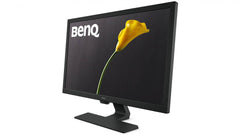
Buying a cheap monitor can be a minefield but there’s no problem whatsoever with the BenQ GL2780. Despite the fact it uses a TN panel, the image quality is second to none at this price. Colour accuracy and contrast are spot on and, although the resolution isn’t the sharpest, 1080p is still fine for most purposes as long as you don’t sit too close.
The GL2780 also has some seriously handy extra features, including an automatic brightness mode, blue light reduction for those who experience eye strain and it has lots and lots of inputs: HDMI, DVI-D, D-SUB and DisplayPort; the only thing missing is USB-C. With a refresh rate up to 75Hz it also makes for a decent budget gaming monitor.
Add built-in speakers and sturdy build quality and you have a product that’s simply stunningly good value for money. If you’re after a big monitor for working at home, look no further than the BenQ GL2780. It’s brilliant.
Key specs – Screen size: 27in; Resolution: 1,920 x 1,080; Screen technology: TN; Video inputs: VGA, DVI, HDMI, DVI-D; Speakers: Yes; Refresh rate: 75Hz
3. Asus ZenScreen MB16ACE: The best portable 1080p monitor

Here’s something you might not have considered before as an alternative to a regular desktop monitor: a portable display like this Asus MB16AMT. It attaches to your laptop via USB-C or HDMI (both cables and a mains adapter are supplied in the box) and comes with a case that props it up at various angles, a bit like an iPad case.
It’s available in a number of different configurations: the one with a battery and touchscreen is the most expensive (MB16AMT) but you can also buy a basic version that sacrifices touch and the battery for a saving of over £100.
All the models use the same 15.6in 60Hz 1080p IPS panel, too, so you're not missing out on image quality. Peak brightness isn’t amazing, but you don’t really need a lot of brightness on an office screen. It has excellent viewing angles and the anti-glare coating means reflections are kept to an absolute minimum. It even comes with an orientation sensor so you can use it in portrait mode as well as landscape.
Colour reproduction is disappointing with sRGB coverage of 57.5% but, otherwise, this is a fantastic solution for those who don’t have space for a full-size desktop monitor.
Key specs – Screen size: 15.6in; Resolution: 1,920 x 1,080; Screen technology: IPS; Video inputs: Mini HDMI, USB-C (DisplayPort); Refresh rate: 60Hz
4. Philips 241B7QUBHEB: The best 1080p monitor with a built-in webcam
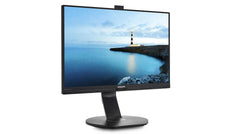
This excellent Philips monitor comes with a built-in webcam and there are two models available: the basic 241B7QPJKEB, which has only DisplayPort, HDMI and VGA inputs; and the 241B7QUBHEB, which adds USB-C and a second HDMI (but removes the VGA input) and has a higher price. The more expensive model also has a faster four-port USB 3.2 Gen 2 Hub, an Ethernet port and adds Windows Hello compatibility to the webcam so you can log in with your face.
Otherwise, the two models are pretty similar and both are superb office screens. Each has a Full HD (1,920 x 1,080) IPS pane, with 178-degree horizontal and vertical viewing angles, and a pop-up webcam with a microphone built-in. There’s Philips' PowerSensor tech that cleverly switches off the display when you're away from your desk, a minimalist design with narrow bezels on three sides and a fantastic stand that allows you to swivel, tilt, rotate and adjust the height of the screen above the desk.
For the money, both models offer a lot of features, and image quality is very good. The panel uses IPS technology so viewing angles are excellent, and there’s even a factory calibrated sRGB mode for those looking to do some serious Photoshop work. Colour accuracy is pretty good in this mode, too.
The panel runs natively at 60Hz but can be overclocked to 75Hz, which means it's better suited for gaming than your traditional 60Hz IPS office monitor.
Key specs – Screen size: 23.8in; Resolution: 1,920 x 1,080; Screen technology: IPS; Video inputs: HDMI, DisplayPort, VGA / ; Refresh rate: 60Hz
The best monitors to buy: 1440p
5. Iiyama ProLite XUB2792QSU-B1: The best 1440p monitor
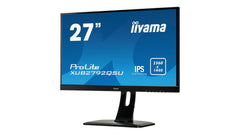
Thanks to Iiyama’s baffling naming conventions, it looks as though we’re repeating ourselves here, and in many ways we are: this 27in 1440p monitor is equally as impressive as its 1080p sibling above.
The Iiyama ProLite XUB2792QSU-B1 is mounted on a versatile stand, with 130mm of height adjustment, 90 degrees of swivel adjustment and support for portrait mode. Like most Iiyama monitors, this model has a very stylish three-sided bezel-less design, with a brushed metal effect very much completing the look.
With support for AMD FreeSync and a 5ms response time, this is an acceptable choice for casual gamers, but it’s as a workday monitor that the Iiyama excels. Particularly if you head to Iiyama’s i-Style Standard colour profile: this locks brightness to 335cd/m² and makes the most of the natural whites of the IPS panel. In testing, it covered 99.3% of the sRGB profile with an average Delta E of 0.28. While we would recommend wider gamut panels to anyone doing colour-sensitive work, this is a great panel for the daily grind.
We mourn the absence of USB-C and wish the speakers had a little more quality, but when you marry the image quality on offer with the low price, it becomes obvious why the XUB2792QSU-B1 takes the crown in the 1440p bracket.
Key specs – Screen size: 27in; Resolution: 2,560 x 1,440; Screen technology: IPS; Video inputs: DisplayPort, HDMI; Speakers: Yes; Refresh rate: 75Hz
6. Philips 258B6QUEB/00: The best 1440p monitor with USB-C
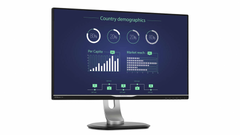
There's an increasing trend for laptops that only have USB-C ports for charging, output and sharing content. This universal adapter is growing in popularity – peripherals, including monitors, are slowly moving towards the adoption of new ports. Philips' 258B6QUEB/00 does exactly that as it has all your regular display inputs, but also includes USB-C.
It's not only the ports that impress – image quality is stunning. With a 1,440p IPS display, the monitor boasts an impressive 98.2% sRGB coverage straight out the box and has a vibrant, yet colour-accurate, image. To top it off, the monitor has a fully adjustable stand that can pivot, tilt and have its height adjusted.
Key specs – Screen size: 25in; Resolution: 2,560 x 1,440; Screen technology: IPS; Video inputs: USB-C, VGA, DisplayPort, HDMI, DVI-D; Refresh rate: 60Hz
7. Eizo FlexScan EV2795: The best for dual-monitor setups
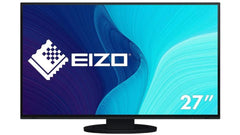
For a dual-monitor setup, Eizo’s FlexScan EV2795 is pretty much the best you can get. The Eizo offers daisy-chaining via USB-C, allowing you to power your laptop through the USB-C input, and connect a second screen with the output, keeping the tangle of cables to a minimum. While this will work fine with screens from other manufacturers, for the best colour-matching, you’re going to want to stick with Eizo.
The stand is remarkably flexible, with an array of adjustment options, including 176mm of height adjustment, and 35° of backwards tilt - ideal for quickly showing your screen to someone standing behind you.
While the Eizo does come with a pair of speakers, they’re not much to brag about, with even your standard video meeting coming through very quietly. And of course, being a professional monitor, this isn’t completely optimised for gaming: while the 60Hz refresh rate and 5ms response time are sufficient, there’s no support for adaptive sync technologies. While casual gamers may want to browse elsewhere on this list, for a professional dual-monitor setup, the Eizo is the absolute best.
Key specs – Screen size: 27in; Resolution: 2,560 x 1,440; Screen technology: IPS; Video inputs: USB-C, DisplayPort, HDMI; Refresh rate: 60Hz; Response time: 5ms
8. Samsung Odyssey G7: The best 1440p gaming monitor
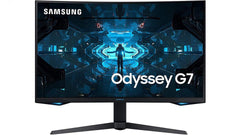
The Samsung Odyssey G7 breaks new ground for gaming monitors. It's the first to feature a dramatic 1000R curvature, which pulls you right into the action when gaming, and it's the first VA panelled screen to have a 1ms GTG response time, ensuring fast, largely blur-free gaming. With a high refresh rate of 240Hz and support for the HDR600 standard it's among the best monitors you can buy from a colour performance perspective as well.
We tested the 32in Odyssey G7 but it's also available in 27in for £550 and that's the model that offers most bang for your buck. The resolution isn't 4K, but at 2,560 x 1,400 it strikes a good balance between sharpness and mitigating the performance impact higher resolution displays inevitably have on gaming performance.
Overall, the Odyssey G7 does just enough to knock our previous favourite, the Acer XF270HUA, from first place. It's a classy gaming monitor with brilliant image quality and incredibly slick gaming credentials.
Key specs – Screen size: 27/32in; Resolution: 2,560 x 1,440; Screen technology: VA; Video inputs: 2 x DisplayPort 1.4, 1 x HDMI 2.0; Refresh rate: 240Hz; Response time: 1ms
The best monitors to buy: 4K
9. Dell UltraSharp U2720Q: The best 4K monitor
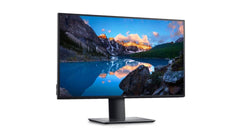
If you’re looking for a practical screen that will reduce cable clutter and reproduce accurate colours, this 27in 4K screen fits the bill – and unlike many competitors, it ordinarily does so for a competitive price. It’s not the most exciting monitor on the planet, but with a vast number of useful features and a gorgeous IPS panel, it’s quietly impressive.
The Dell UltraSharp U2720Q is packed with all the ports most people will need, with DisplayPort 1.4 and HDMI 2.0 inputs keeping the USB-C port company. It also sports three USB-A ports for peripherals, one of which is powered. The OSD is easy to use and responsive, relying on four small buttons mounted at the bottom of the screen. They change function depending on context – for example, up, down, select and back if changing a value – and the sensible icons make it easy to understand what’s going on.
This is also one seriously adjustable monitor. On top of the usual 130mm of height adjustment and 90 degrees of rotation, the UltraSharp can also pivot 45 degrees from left to right, making it easier to adjust for odd viewing angles.
Top all of this off with some stellar results in our various benchmarking tests and you’ve got yourself a great all-rounder at a very, very reasonable price.
Key specs – Screen size: 27in; Resolution: 3,840 x 2,160; Screen technology: IPS; Video inputs: DisplayPort, HDMI, USB-C; Speakers: No; Refresh rate: 75Hz
10. AOC U2790PQU: The best budget 4K monitor

If you’re looking for a 4K 27in IPS screen, and have a budget of under £300, we’re happy to recommend the AOC U2790PQU. In spite of the low price, it manages to hold onto a few crucial features for heavy users, lessening the number of sacrifices you’ll make in the process of saving money.
For example: the AOC U2790PQU offers just as many adjustment options as its more expensive rivals. The three key benefits here are 130mm of height adjustment, 90 degrees of swivel and support for portrait mode – that’s more than you’ll find on most budget monitors. Anecdotally, the stand is sturdy enough to prevent wobble when accessing the on-screen display, something that’s also a rarity among budget panels.
Provided you switch the AOC from default to sRGB mode, you can expect good image quality, with strong colour reproduction and a low Delta E. Contrast is less impressive at 869:1, but peak brightness is more so at 465cd/m². In other words, this is a fine monitor for office use but perhaps not for professionals.
At its core, though, the AOC U2790PQU is impressive simply because it packs 3,840 x 2,160 pixels into a remarkably classy 27in frame at a price that cannot be ignored. There are compromises, but they have been thoughtfully picked so as to not detract from the overall user experience.
Key specs – Screen size: 27in; Resolution: 3,840 x 2,160; Screen technology: IPS; Video inputs: DisplayPort, HDMI; Speakers: Yes; Refresh rate: 75Hz
The best monitors to buy: Ultrawide
11. LG UltraWide 38WN95C: The best ultrawide monitor
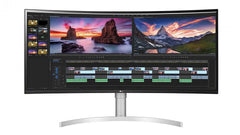
If money is no object, or if you value productivity above all else, this is the monitor to buy. With 37.5in of IPS panel to play with, the LG UltraWide 38WN95C is an astonishingly large monitor; we found that we could easily place three separate windows side-by-side without overlap.
That enormous curved panel refreshes at 144Hz, offers a boosted resolution of 3,840 x 1,600 and supports both Nvidia G-Sync and AMD FreeSync. If you have a rig that can handle it, this is also a seriously good gaming monitor.
But the 38WN95C is an office monitor first and foremost, and that much is evident in the pleasing number of ports in play. Alongside the standard HDMI 2.0 and DisplayPort 1.4 ports, you’ll also find two USB-A ports and a Thunderbolt USB-C port capable of delivering 90W of power to a connected device. Being a hefty monitor, adjustment options are a tad more limited, but you’re still getting 110mm of height adjustment and 30 degrees of swivel, which is more than enough to ensure that you maintain good posture.
As you’d expect, the 37.5in IPS panel performed exceptionally well in testing, with fantastic gamut coverage backed by an average Delta E of 0.91 (below 1 is excellent) and a measured peak brightness that far exceeded LG’s stated 450cd/m².
We’re even fans of the OSD, which is so quick and easy to understand that you’ll be navigating through its options in no time at all (once you find it, as the mini joystick control is tucked beneath the LG logo).
Key specs – Screen size: 37.5in; Resolution: 3,840 x 1,600; Screen technology: IPS; Video inputs: DisplayPort, HDMI, USB-C; Speakers: Yes; Refresh rate: 144Hz
12. Samsung C34J79: The best ultrawide monitor for MacBook
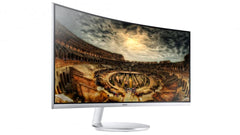
Samsung's C34J79 supersedes the older CF791 by adding two Thunderbolt 3 ports to its arsenal. Otherwise, it's the same monitor as its predecessor but will appeal to those who have a modern-day laptop that has a Thunderbolt 3 port, such as the MacBook Pro.
The monitor utilises a quantum dot VA panel to reproduce accurate colours. With its 1500R curvature and 100Hz refresh rate, you'll be immersed in movies, games and videos. Better still, the monitor runs at a 3,440 x 1,440 resolution, resulting in crystal clear text and less blurry images on a 34in ultrawide 21:9 monitor. If you've got the budget and you're in the market for a do-it-all ultrawide monitor, the Samsung C34J79 or CF791 (if you don't need Thunderbolt 3 ports) should be at the top of your wish list.
Key specs – Screen size: 34in curved; Resolution: 3,440 x 1,440; Screen technology: VA; Video inputs: DisplayPort, 2 x HDMI; Refresh rate: 100Hz
13. BenQ EX3501R: The best ultrawide monitor with HDR

Despite its age, the EX3501R is an impressive large-screen monitor. It has a 35in curved display that runs at a resolution of 3,400 x 1,440 at 100Hz. Its VA panel is colour accurate and, for a monitor of its size, it has good brightness uniformity. Its most impressive trait (especially at this price point) is the inclusion of HDR – you can watch and play HDR content through it.
The EX3501R is also stunning to look at, with its metal stand, a three-sided borderless design and a 1800R curvature. It's intelligent, too, with an ambient light sensor that the company calls “Brightness Intelligence Plus”. Here, the panel will adjust to ambient light conditions, adaptively changing the colour temperature to reduce eye strain.
If you're looking for a do-it-all big screen monitor, and have the budget for it, the EX3501R is an excellent pick.
Key specs – Screen size: 35in curved; Resolution: 3,440 x 1,440; Screen technology: VA; Video inputs: DisplayPort, 2 x HDMI; Refresh rate: 100Hz
0 comments